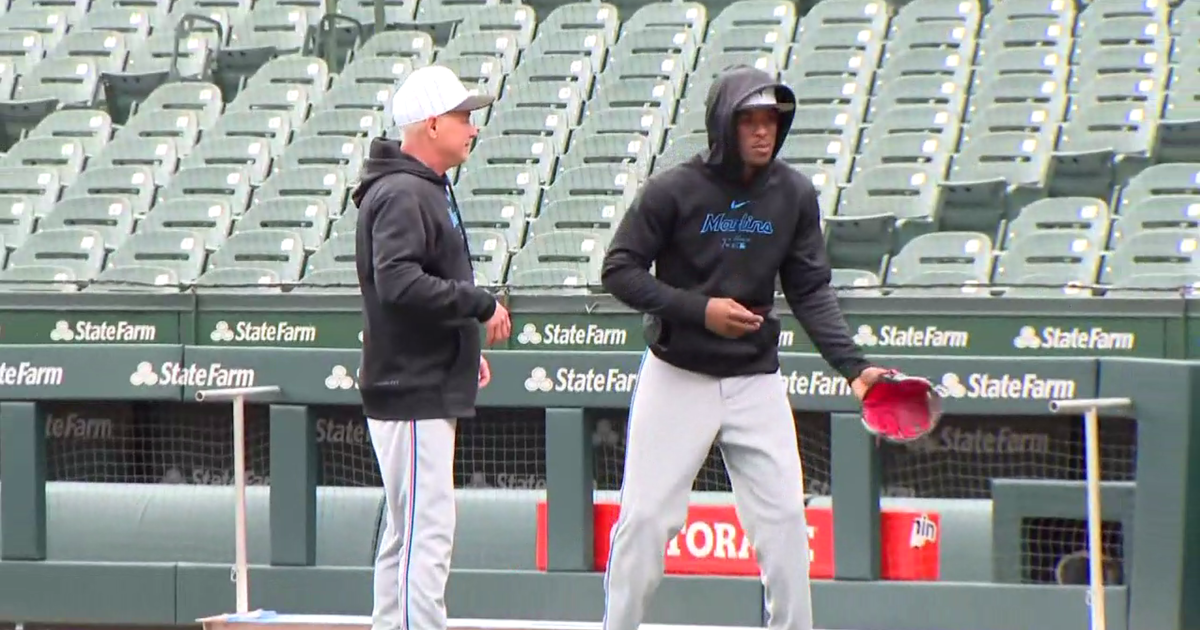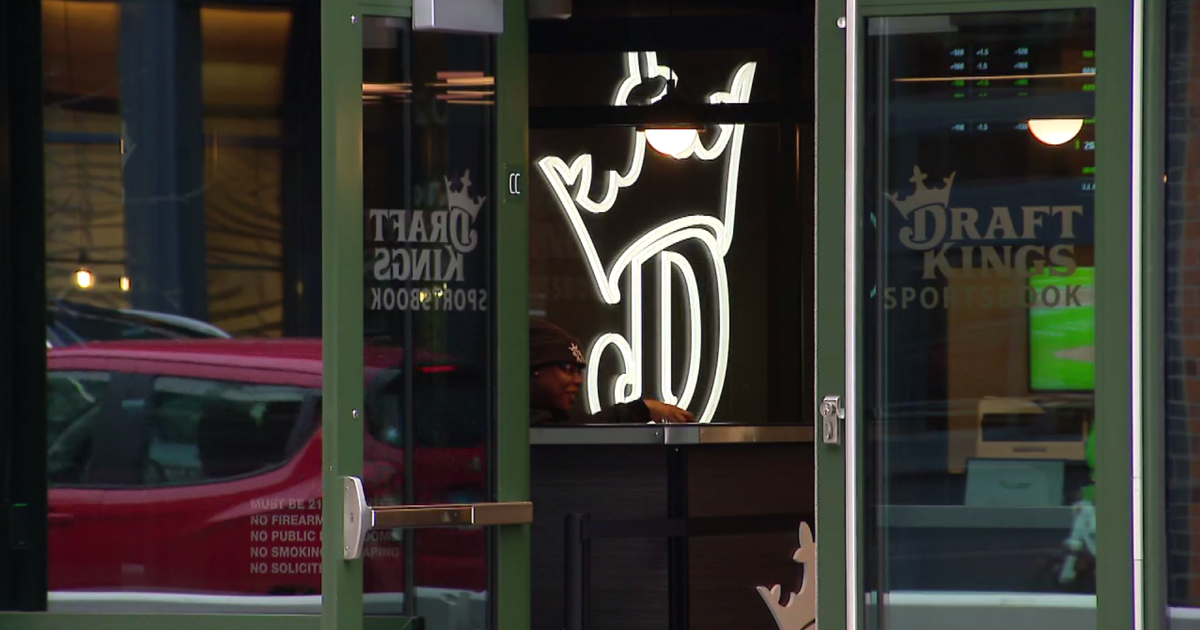Boers: Grasping The True Meaning Of Fatherhood
By Terry Boers--
(CBS) My first writing assignment for a major metropolitan newspaper should have been a cinch. I was given the chance to cover a small college football game for the Detroit Free Press, even though the paper's editors had made me promise in blood that I would never, ever ask to write, that working the night sports desk was my only assignment.
Hey, a deal is a deal. All good. I kept my mouth shut.
Then, in the fall of 1979, my boss Ken Clover came to me and wondered if I'd like to work a Saturday football game. I didn't hesitate to say yes to the opportunity. His parameters were basic: Write 10 paragraphs and have it in before the 7 p.m. deadline so it would make the state edition.
Got it.
Did I mention it was a noon game? And that it ended at right around 3 p.m. when the home team kicked a field goal with a only couple of seconds left to win the game?
Now, I had written hundreds and hundreds of such accounts of high school games starting in 1972. Only a few were on any kind of deadline, but one would think that I would have the drill down, that this would be a breeze, especially given the brevity of the story and the way the game ended.
I wasn't thinking that anymore around 6 p.m. when I hadn't written a single word, unless you count the byline.
My mind was goo. I had nothing, nada. Only now do I realize that on that stressful day I was no different than Tony Siragusa standing in the end zone.
The Freep desk had already called on the press box phone for a wellness check. By that time I'd been up and down the press box stairs at least dozen times. I don't know if I was looking for some strange inspiration, another smoke or just trying to get my mind to work for those 10 lousy graphs.
Finally, around 6:15, I started to notice the guy who was in charge of cleaning the press box didn't seem all that happy. He loudly cleared his throat a few times, just making sure I knew he was waiting. The satrap looked like he was poised to lock me in. Mercifully, I finally started to write.
I can't describe how I felt when the piece was finally sent around 6:55. I know there was great relief, but mostly it was overwhelming embarrassment. And I don't even recall if the story was good or bad, although bad is by far the more likely of the two. I never looked at it again.
Moments later, I had this feeling of dread. Come Monday afternoon, I was going to see Clover. He'd acted as my mentor when I came aboard in Detroit, and he obviously believed in me. What would he say? Turns out, he just walked by and said with a drip of sarcasm in his delicious Southern drawl, "Thanks for making deadline." That was it, never another word about it.
That was the day I promised myself that would never happen again. And it didn't. There were other close deadline calls in the next few years, but nothing like that first time. Eventually, I got to be fast. Really, really fast. How fast? Jimmy John's fast.
The point here is that I am hardly a quick study. Most everything I've done in my life has taken more time than seems necessary to learn. Geez, I even failed the driver's license test twice because I couldn't parallel park.
How lame is that?
So it wasn't surprising that I was struggling to be a good dad. Just like the professional part of my life, it was similarly a lot of trial and mostly error.
But when you're a father and husband before your 21st birthday, the learning curve can be very, very steep. Mine sure was -- like Mt. McKinley.
But then, I don't how many 20-year-old guys would be ready for all that responsibility.
My oldest son, John, was born about a month before I turned 21, and I can honestly say I didn't know how to act. My response was to make myself scarce, spending most of the '70s working a ton of hours, playing in two softball leagues and also finding a time to bowl with my buddies, as if I wasn't out enough.
That was pretty ambitious for a guy making $560 a month.
But I was lucky to have a wife who more than picked up the slack, seamlessly becoming a great mother amid some truly turbulent times. And she continued to work, even after giving birth to our second son, Joe, in 1976.
Shortly after, our life changed drastically when John, then 6, was diagnosed with leukemia.
There were the constant trips to then Children's Memorial Hospital (and later at the Children's Hospital in Ann Arbor, Mich.) for treatments. Then came the spinal taps that had John yowling and us doing our best to keep from crying, although we both did.
And even though the medicine had put his leukemia in remission, we ran into an even bigger problem when John contracted chicken pox, the one disease that we were warned from the beginning that could be fatal.
It nearly was.
We didn't leave the hospital for two weeks because even further complications had John clinging to life for three horrible days. We slept in the hospital or at the Ronald McDonald house when we slept at all, mostly wiping away tears and walking around in a daze.
Almost miraculously, John finally turned the corner and started to get better, just as the great Dr. Elaine Morgan had believed he would.
But even as I began to grasp the true meaning of fatherhood, that this was the most important job I'd ever have, my professional ambition continued to get in the way, just as it has across generations of upwardly motivated dads, going back as far as you wish.
If we were going to turn any kind of financial corner, I had to get myself to a place where the money wasn't going to be as much of an issue.
Getting back home helped in 1980, when I was hired by the Sun-Times for, what else, desk duty. But working 3-11:30 p.m. was hardly conducive to more quality time at home.
It got even worse when I began covering the Bulls in 1982, a job I got only because Richard Justice had accepted the gig. Then at the last minute, he decided he would instead go to the Washington Post.
As it turned out, it was exactly the chance I needed. Although there were desk guys who I thought were probably more qualified than myself, our boss, Marty Kaiser, asked me if I wanted to give it a try. Boy, did I.
Thus began another merry-go-round of a decade that saw me beg off the Bulls in 1985. But even doing a little of this and a little of that left me away from home far too much. And did I mention that I was now the father of twins, Chris and Cary, born in 1983?
That brought a whole new meaning to hectic. Most days were pure chaos. We were stuffed in a house that didn't fit our needs, but we somehow we got by with only minimal damage, at least in my mind.
When I was asked to take over the column in 1988 after John Schulian left, I couldn't say no, especially given the pay raise. No, the money wasn't spectacular, but it was something we needed. It also afforded me some additional home time, but not nearly enough -- take, for example, the three-week trip to South Korea for the 1988 Olympics.
Ultimately, I begged off the column in 1991 for a variety of reasons, but mainly because I felt I'd become an absentee parent. By this time, John was in college, Joe was already in the midst of playing basketball and baseball in high school and the twins were a couple of live wires.
The bottom line is that I missed an awful lot of my kids' lives because of those travel-filled years, but I have done my best since then to atone. Sadly, you can never get any of it back.
In the 24-plus years since putting the newspaper business in the rear-view mirror, I've enjoyed some truly amazing times thanks to my children and grandchildren. And I no longer dwell on what I missed of their lives, choosing instead to celebrate who've they become during both the good and sometimes excruciatingly painful times we've shared as a family.
A friend of mine asked me recently about my legacy, wondering where I fit in the world of newspapers and radio. My answer was I don't know and I don't care. Whatever I leave behind professionally will soon be forgotten, and that's fine by me. My legacy will always be my sons.
American politician and author Frank A. Clark once wrote, "If you can find a path with no obstacles, it probably doesn't lead anywhere.''
Amen to that.
Have a great Father's Day.
A longtime sportswriter for the Chicago Sun-Times, Terry Boers now co-hosts The Boers and Bernstein Show, which can be heard Monday-Friday from 1 p.m.-6 p.m. on 670 The Score.



